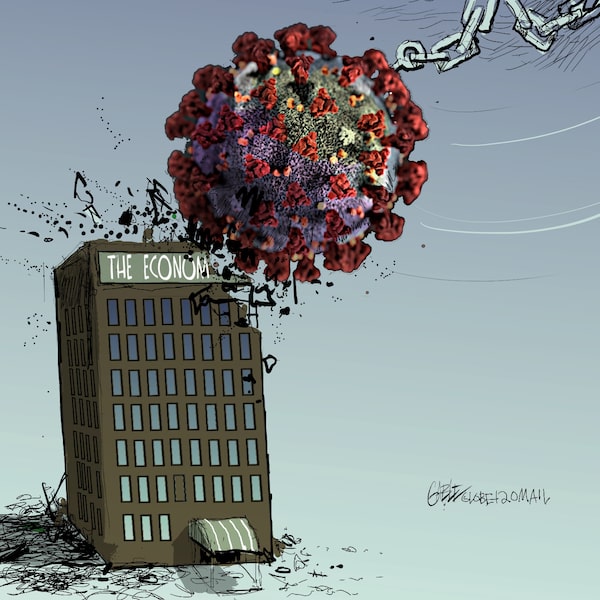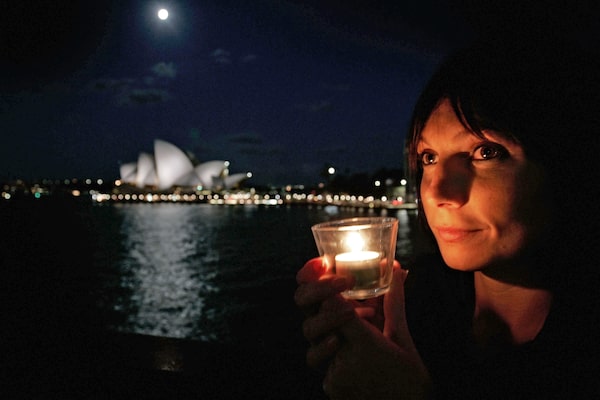Good morning,
These are the top stories:
The tragedy inside the nursing homes
The Ontario government says it will probe a “tragic situation” unfolding at the Pinecrest Nursing Home in Bobcaygeon, Ont., where nine residents have died of COVID-19, but it won’t commit to further transparency or testing at seniors’ facilities. As of Monday, 24 Pinecrest staff have also tested positive for the virus, with results pending for another 10.
In a survey yesterday of numerous public-health units in Ontario, The Globe and Mail has learned of 26 long-term-care homes with at least one case of COVID-19. Seventeen residents have died of the virus.
Ontario extends state of emergency
In other Ontario news, Premier Doug Ford said that he would be extending Ontario’s state of emergency, which had been set to expire today. He ordered many facilities closed, including daycares, libraries, and bars and restaurants except to do take-out or delivery. Ontario will also close all outdoor recreational amenities, such as sports fields and playgrounds, effective immediately.
The welcome wage subsidy
The federal government has vastly expanded the 75-per-cent wage subsidy for small businesses to include large companies as well as charities and non-profits to encourage them to keep workers on the payroll during the pandemic. This news, announced by Prime Minister Justin Trudeau during his daily news conference, was met with widespread praise from business organizations.
Trudeau said that the subsidy will be open to any business or organization that has suffered a 30-per-cent drop in revenue as a result of the coronavirus.
"The number of employees you have will not determine whether you get this support. It will apply to non-profit organizations and charities as well as companies both big and small,” Trudeau said.
Too big to fail
Meanwhile, the emergency legislation the Canadian government passed last week bolsters Ottawa’s ability to step in and purchase troubled assets from financial institutions or other companies if necessary.
Government officials say the kind of actions envisioned under the new legislation would only be employed in a worst-case scenario, offering the government a way to act directly to prop up not only financial institutions but other companies that might be deemed to have strategic economic value, such as airlines.
Canada’s hotspot
Quebec had its biggest single-day increase of COVID-19 cases yesterday with 590 new cases, bringing the total to 3,430. However, the 19.6-per-cent three-day average growth in new cases is 6.4 percentage points lower than the previous three days, leading public health authorities to say they are optimistic the province’s rate of acceleration in new cases is slowing down.
‘Ready to answer the call’
Ottawa says 24,000 members of the Canadian Armed Forces stand ready to support provinces in the event that they request their assistance fighting the COVID-19 pandemic. Mr. Trudeau said provinces have not asked for the military to intervene, but if that were to change, the Canadian Armed Forces are “ready to answer the call.”
Defence Minister Harjit Sajjan said the forces are staying “flexible” to respond to a range of requests, whether it be a surge in need or help with logistics, with particular attention paid to Northern and Indigenous communities.
From farm to table
European farm groups are warning that border restrictions and quarantines across the continent have created a sudden shortage of seasonal workers just ahead of the spring planting season. The workers are employed extensively in Europe’s wealthy regions for farm production, with some of the bigger countries granting short-term work visas every year to hundreds of thousands of agricultural labourers, most of them from Eastern Europe.
A rabbi, a priest and an imam walk into an empty place of worship...
Next month, three of the world’s biggest religions will cancel services celebrating Passover, Easter and Ramadan, all of it unprecedented in modern times. Even Jerusalem’s Church of the Holy Sepulchre, regarded as the site of Jesus’s tomb, has closed doors this week for the first time since the Black Plague in 1349. This has got rabbis, priests, imams and ministers rethinking how to reach their flocks.
OPINION
How did you win the coronavirus war? I stayed home
Editorial: “A virus whose stealthy propagation was mostly unseen two weeks ago is making itself known right on schedule.”
The COVID-19 pandemic will create winners and losers
John Ibbitson: “Downsizing office space and encouraging work from home could be a lasting legacy of this pandemic.”
Boycott Trump’s TV press conferences? No point, every politician is on the campaign trail now
John Doyle: “He blusters, he rambles and later he boasts about the ratings. Even a house cat can see the pressers amount to 90 minutes of narcissism.”
Canada can flatten its pandemic curve by taking lessons from South Korea
Tina Park: “Public-private partnership is essential for easy, affordable and safe access to testing centres. In South Korea, private companies quickly developed and disseminated standardized testing kits for COVID-19; these are now being exported.” Tina J. Park is a co-founder and executive director of the Canadian Centre for the Responsibility to Protect, based at the University of Toronto.
RESOURCE CENTRE
- Explainer
- Latest developments
- André Picard answers reader questions
- How to practise social distancing
- Cleaning tips
- What essentials to buy
- How to self-isolate
- How to apply for EI, other financial relief
- Employment law questions answered
- Essential businesses listed by province
Have you had to self-quarantine because of the coronavirus? We want to hear your story. E-mail: tips@globeandmail.com
This is the daily Morning Update newsletter. If you’re reading this on the web, or it was forwarded to you from someone else, you can sign up for Morning Update and more than 20 more Globe newsletters on our newsletter signup page.
Got a news tip that you’d like us to look into? E-mail us at tips@globeandmail.com Need to share documents securely? Reach out via SecureDrop
MORNING MARKETS
World stocks looked set to close their worst quarter since 2008 on a brighter note, as strong Chinese factory data held out hope for an economic revival even as much of the rest of the world shut down to fight the coronavirus.
Japan’s benchmark Nikkei 225 rose in morning trading but reversed course to dip nearly 0.9 per cent, finishing at 18,917.01. Hong Kong’s Hang Seng stood at 23,603.48, up 1.9 per cent.
European stocks rallied at the open. France’s CAC 40 gained 1.15 per cent, the German DAX 2.08 per cent and Britain’s FTSE 100 1.8 per cent.
TODAY’S EDITORIAL CARTOON

CartoonBrian Gable/The Globe and Mail
LIVING BETTER
Lift your spirits with some of our favourite recent First Person essays
This collection of humorous and heartwarming reads offers life lessons both big and small.
MOMENT IN TIME

SYDNEY, AUSTRALIA - MARCH 31, 2007: Katie Ibbotson from the Cruise Bar has a candle lit during Earth Hour March 31, in Sydney, Australia. The entire city of Sydney, including companies, government departments, individuals and families have been urged to switch off their lights for one hour. The event is the launch of a 12 month campaign organized by WWF (World Wide Fund for Nature) Australia to reduce Sydney's greenhouse gas emissions by 5%.(Photo by Lisa Maree Williams/Getty Images)Lisa Maree Williams/Getty Images
On the evening of March 31, 2007, Sydney went dark. More than two million people and 2,000 businesses in Australia’s most populous city turned off their lights, participating in the world’s first Earth Hour. The annual event has since spread to more than 185 countries and territories across seven continents, engaging millions of individuals who enjoy 60 minutes of darkness or illuminate their spaces with flickering candles. The global movement has also gone extraterrestrial: In 2013, Canadian astronaut Chris Hadfield documented the event from the International Space Station, photographing major cities and expressing appreciation for nature’s Northern Lights. The goal of Earth Hour is not to reduce electricity consumption or carbon emissions for the duration of the event, although that is a plus. Instead, the aim is to spur conversations about tackling climate change and preserving biodiversity. It has led to action, too. Argentina, for example, used its Earth Hour campaign to catalyze the designation of a 3.4-hectare marine protected area, and Paraguay used the platform to galvanize public support for a logging moratorium. Organized by the World Wildlife Fund, Earth Hour typically takes place on the evening of the last Saturday in March. – Kathryn Blaze Baum
If you’d like to receive this newsletter by e-mail every weekday morning, go here to sign up. If you have any feedback, send us a note.